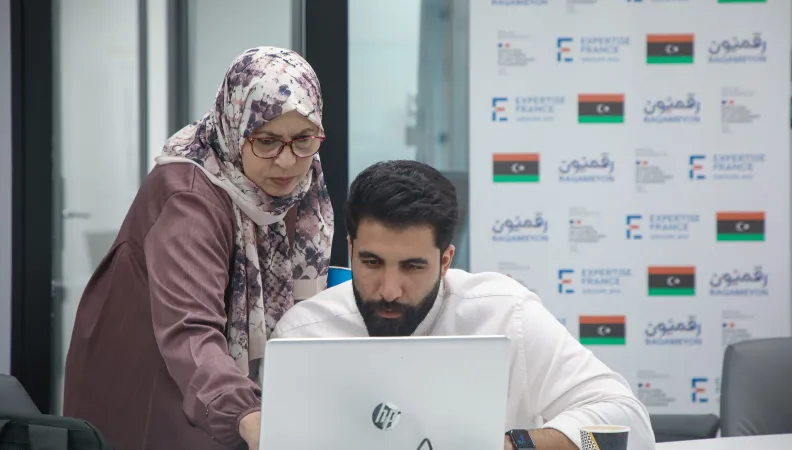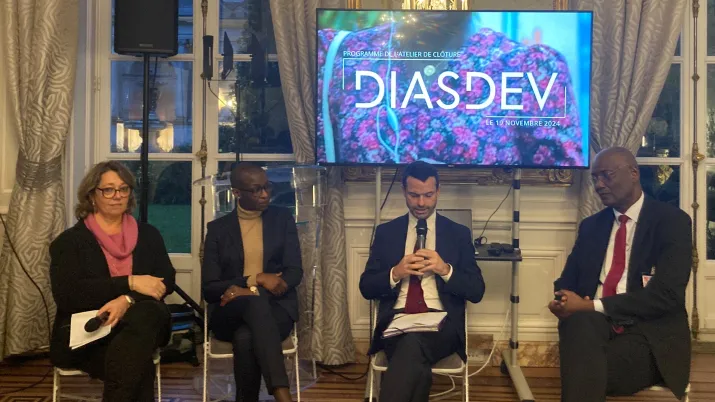Share the page
Raqameyon : empowering tomorrow’s digital innovators in Libya
Project
Published on

-
Project start date
-
-
Project end date
-
-
Financing amount (Euro)
-
€0.7m
-
Country and region
-
Libya
The project aims to support the digital transition in Libya by contributing to the diversification of the job market, focusing on the digital economy
Context
This new project came as a continuation of its predecessor project, “Raqam-e”, also funded by France and implemented by Expertise France. During its two years of implementation, the Raqam-e project engaged a large community of technology enthusiasts and successfully organized many digital boot camps and hackathons. The establishment of coding academies in four municipalities was one of the major steps Raqam-e project to spread digital and coding cultures in Libya.
It is well known that the path of digital transformation consists of several stages in which all components of society participate. It is a culture that is created by what the citizen learns and by keeping pace with technological developments in the business world and the methods of providing them by public or private service providers.
Based on the Libyan need to upgrade their digital skills and keep up with technological development to enter the era of digital transformation, Raqameyon project will build on the lessons learned from the preceding project, Raqam-e, and count on the engagement of the tech enthusiasts’ community that has been created by Raqam-e’s activities like coding boot camps, capacity-building programs, and hackathons.
Find out more about Raqam-e
"The General Information Authority works to support digital transformation in Libya at several levels, including developing a comprehensive national strategy for digital transformation in the country. This strategy will only be feasible to implement on the ground if the digital culture is spread in the educational and work environments, the capabilities of public and private sector employees are raised, and the level of training provided to young people interested in technology is improved in Libya. The Raqameyon project will contribute to enhancing our future vision and is considered a positive step in achieving our goals." said Mr. Abdul Basit Al-Baour - Chairman of the General Information Authority in Libya.
H.E Mr. Mostafa MIHRAJE, Ambassador of France in Libya, said: “The world is facing increasingly complex and interconnected challenges. New digital technologies are among them. The synergies we have built with our Libyan partners have allowed us to accelerate digitalization efforts, which in turn supports economic growth, creates more jobs, and allows for better use of resources. France is honored to continue supporting Libya’s digital transition through the Raqameyon project, which focuses on capacity building to equip Libyan youth with tools that will effectively harness their talents and help them become key drivers of Libya’s digital economy.”
Objectives of the Raqameyon project
The project supports the digital transition in Libya through 4 main actions:
1: Training "Getting Started with the Pack Office" for different types of audiences (public and private employees and women).
2: Supporting the Ministry of Education in the deployment of digital training in 5 Libyan schools.
3: Providing digital skills training for entrepreneurs and SMEs.
4: Expert training in digital skills depending on Libyan partners’ needs.
Main expected results
- 8 training companies benefit from a capacity building program, and 2,160 people are trained in using Microsoft tools.
- 1 digital training platform formalized, 2 Ministry of Education agents, and 8 teachers trained to deliver this training.
- 5 digital boot camps organized in 5 schools across the country.
- 240 entrepreneurs trained to use digital tools to develop their businesses.
- 320 hours of training provided in several areas identified as key.
Similar projects
EU Global Facility on Anti-Money Laundering and Countering the Financing of Terrorism (GF-AML/CFT)
Ongoing
2017 - 2026
Funders : European Union
Implementing effective Green Budgeting practices in the European Union
Ongoing
2025 - 2028
Funders : European Union








